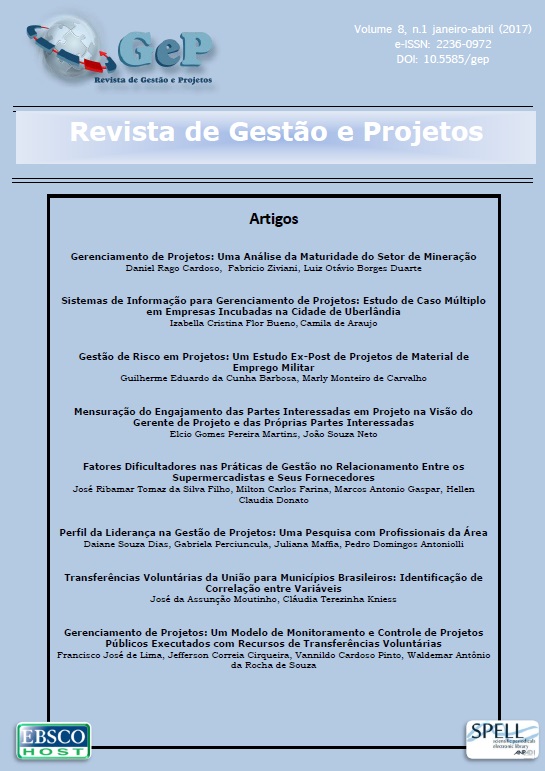Gestão de Risco em Projetos: Um Estudo Ex-Post de Projetos de Material de Emprego Militar
DOI:
https://doi.org/10.5585/gep.v8i1.396Palavras-chave:
Projetos, Gerenciamento de riscos, Projetos de manutenção.Resumo
O objetivo desse artigo é analisar a gestão de risco no contexto de sistemas militares, desenvolvidos por meio de parcerias público privadas. A abordagem de pesquisa adotada é de estudo exploratório desenvolvido em três projetos de modernização de veículos militares. Os resultados sugerem que há uma grande atenção para evitar riscos técnicos, o que desencoraja qualquer modificação do material. Outro aspecto destacado é o risco jurídico dado que vários projetos são parcerias público privadas, sendo que os aspectos legais têm forte influência para o formato do projeto, demandando a integração de especialistas de direito à equipe. A cadeia de suprimentos é crítica e o fluxo de material precisa ser ágil, mas é difícil determinar a priori a demanda real de peças de reposição. Dados históricos demonstram que as previsões ruins foram as principais causas do aumento de custos.
Referências
Aritua, B., Smith, N. J., Bower, D. (2011) What risks are common to or amplified in programmes: evidence from UK public sector infrastructure schemes. International Journal of Project Management, 29(3), 303–312.
Aven T., & Kørte J. (2003) On the use of risk and decision analysis to support decision-making. Reliability Engineering and System Safety, 79(3), 289-299.
Barbosa, G. E. C. (2005) Recuperação e/ou modernização de máquinas: uma abordagem voltada à confiabilidade. São Paulo: Escola Politécnica da Universidade de São PauloDissertação de Mestrado, 188p.
Carvalho, M.M., & Rabechini Junior, R. (2015a) Impact of risk management on project performance: the importance of soft skills. International Journal of Production Research. 53(2), 321–340.
Carvalho, M. M., & Rabechini Jr, R. (2015b) Fundamentos em gestão de projetos: construindo competências para gerenciar projetos. São Paulo: Editora Atlas, (4ª edição).
De Bakker, K, Boonstra, A., & Wortmann, H. (2010) Does risk management contribute to IT project success? A meta-analysis of empirical evidence. International Journal of Project Management. 28 (5), 493–503.
De Bakker, K, Boonstra, A, & Wortmann, H. (2011) Risk management affecting IS/IT project success through communicative action. Project Management Journal. 42( 3), 75–90.
Deng, X., Low, S. P., Li, Q., Zhao, X. (2014) Developing competitive advantages in political risk management for international construction enterprises. Journal of Construction Engineering and Management, 140(9), 1–10.
Guimarães, I.C., Parisi, C., Pereira, A.C., Weffort, E.F.J. (2009) The controllership relevance for risk management in non-financial companies: a study of risk managers’ and controllers’ perceptions. 11(32), 260-275.
Hanaoka, S., Palapus, H. P. (2012) Reasonable concession period for build-operate-transfer road projects in the Philippines. International Journal of Project Management, 30(8), 938–949.
Huchzermeier, A, & Loch, C. H. , (2001) Project management under risk: using the real options approach to evaluate flexibility in R&D. Management Science, 47(1), 85–101.
Hwang, B.-G., Zhao, X., & Gay, M.J.S. (2013) Public private partnership projects in Singapore: Factors, critical risks and preferred risk allocation from the perspective of contractors. International Journal of Project Management, 31(3), 424–433.
Ke, Y., Wang, S., Chan, A. P. C., Lam, P.T.I. (2010) Preferred risk allocation in China’s Public–Private Partnership (PPP) Projects. International Journal of Project Management, 28(5), 482–492.
Krane, H.P., Rolstadas, A, & Olsson, N.O.E. (2010) Categorizing risks in seven large projects-which risks do the projects focus on? Project Management Journal, 41 (1), 81–86.
Kutsh, E,., & Hall, M. (2010) Deliberate ignorance in project risk management. International Journal of Project Management, 28(3), 245–255.
Kwak, Y.H,., &Smith, B.M. (2009) Managing risks in mega defense acquisition projects: performance, policy, and opportunities. International Journal of Project Management, 27(8),812-820.
Larrère, J. (2004) Risk management and lessons learned solutions for satellite product assurance. Acta Astronautica, 55 (3-9), 811 – 816.
Lee, C. H., & Yu, Y.-H. (2011) Service delivery comparisons on household connections in Taiwan’s sewer public–private-partnership (PPP) projects. International Journal of Project Management, 29(8), 1033–1043.
Lui, K.M,., & Chan, K.C.C. (2008) Rescuing troubled software projects by team transformation: a case study with an ERP project. Ieee Transactions on Engineering Management, 55(1), 171-184.
Meier, SR. (2008) Best project management and systems engineering practices in the preacquisition phase for federal intelligence and defense agencies. Project Management Journal, 39 (1), 59–71.
Miguel, P. A. C., (2010) Metodologia de pesquisa em engenharia de produção e gestão de operações. Rio de Janeiro: Elsevier.
Morris, P.W.G., Pinto, J.K., & Soderlund, J. (Eds.) (2012) The Oxford handbook of project management, Oxford University Press, Oxford, UK .
Paté-Cornell, E. (2002) Finding and fixing system weaknesses: probabilistic methods and application of engineering risk analysis. Risk Analysis, 22(2), 319-334.
PMI (Project Management Institute). (2013) A guide to the project management body of knowledge (PMBoK). (5th ed.) Maryland: Project Management Institute Inc.
Segismundo, A., Miguel, P. A.C. (2008) Failure mode and effects analysis (Fmea) in the context of risk management in new product development - a case study in an automotive company. International Journal of Quality & Reliability Management, 25 (9), 899-912.
Smith, D. J. (2001) Reliability, maintainability, and risk: practical methods for engineers. Oxford: Butterworth-Heinemann, 348p.
Voss, C., Tsikriktsis, N. & Frohlich, M. (2002) Case Research in Operations Management. International Journal of Operations and Production Management, 22(2), 195-219
Wang, M.T., & Chou, H.Y. (2003) Risk allocation and risk handling of highway projects in Taiwan. Journal of Management in Engineering, 19(3).
Xu, Y., Sun, C., Skibniewski, M. J., Et Al. (2012) System Dynamics (SD) -based concession pricing model for PPP highway projects. International Journal of Project Management, 30(2), 240–251.
Zwikael, O, & Ahn, M. (2011) The effectiveness of risk management: an analysis of project risk planning across industries and countries. Risk Analysis, 31(1), 25–37.
Downloads
Publicado
Como Citar
Edição
Seção
Licença
Copyright (c) 2017 Guilherme Eduardo da Cunha Barbosa, Marly Carvalho

Este trabalho está licenciado sob uma licença Creative Commons Attribution-NonCommercial-NoDerivatives 4.0 International License.
- Resumo 431
- PDF 466







